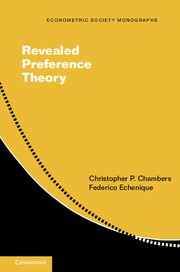Book contents
- Frontmatter
- Dedication
- Contents
- Preface
- 1 Mathematical Preliminaries
- 2 Classical Abstract Choice Theory
- 3 Rational Demand
- 4 Topics in Rational Demand
- 5 Practical Issues in Revealed Preference Analysis
- 6 Production
- 7 Stochastic Choice
- 8 Choice Under Uncertainty
- 9 General Equilibrium Theory
- 10 Game Theory
- 11 Social Choice and Political Science
- 12 Revealed Preference and Systems of Polynomial Inequalities
- 13 Revealed Preference and Model Theory
- References
- Index
- Miscellaneous Endmatter
8 - Choice Under Uncertainty
Published online by Cambridge University Press: 05 January 2016
- Frontmatter
- Dedication
- Contents
- Preface
- 1 Mathematical Preliminaries
- 2 Classical Abstract Choice Theory
- 3 Rational Demand
- 4 Topics in Rational Demand
- 5 Practical Issues in Revealed Preference Analysis
- 6 Production
- 7 Stochastic Choice
- 8 Choice Under Uncertainty
- 9 General Equilibrium Theory
- 10 Game Theory
- 11 Social Choice and Political Science
- 12 Revealed Preference and Systems of Polynomial Inequalities
- 13 Revealed Preference and Model Theory
- References
- Index
- Miscellaneous Endmatter
Summary
In this chapter we turn to models of choice under uncertainty. We consider an agent who makes choices without fully knowing the consequences of those choices, and focus on models in which uncertainty can be quantified and formulated probabilistically. The most important such model is, of course, expected utility.
OBJECTIVE PROBABILITY
There are times when probabilities can be thought to be objective and known, or observable. This is the case, for example, when outcomes are randomized according to some known physical device—such as a game in a casino, or a randomization device used by an experimenter in the laboratory.
We consider two basic environments. In one the primitive objects of choice are lotteries. In the other, the objects of choice are state-contingent consumption.
Notation
Let X be a finite set. We denote by Δ(X) = ﹛p ∈ RX : p ≥ 0; ∑x∈X p(x) =1﹜ the set of all probability distributions over X.
Choice over lotteries
Given is a finite set X of possible prizes. Δ(X) is the set of all lotteries over X. We imagine an agent who chooses a lottery. The agent understands that there is uncertainty over the realization of the lottery: over which prize the lottery will result in. But the probabilities specified in the lottery are accurate (or at least useful) representations of that uncertainty.
We investigate a very basic result on revealed preference in this environment.
An expected utility preference is a binary relation for which there exists u : X→R such that for all p,q ∈ Δ(X),
The classical axiomatization of expected utility preferences relies on the independence axiom of decision theory; namely, that for all p,q, r ∈ Δ(X) and all.
Most experimental studies refuting the expected utility model are direct refutations of the independence axiom. The best-known such refutation is through a thought experiment, known as the Allais paradox. Instead of setting up a thought experiment, we are going to assume that we are given data on choices among pairs of lotteries.
- Type
- Chapter
- Information
- Revealed Preference Theory , pp. 114 - 128Publisher: Cambridge University PressPrint publication year: 2016

